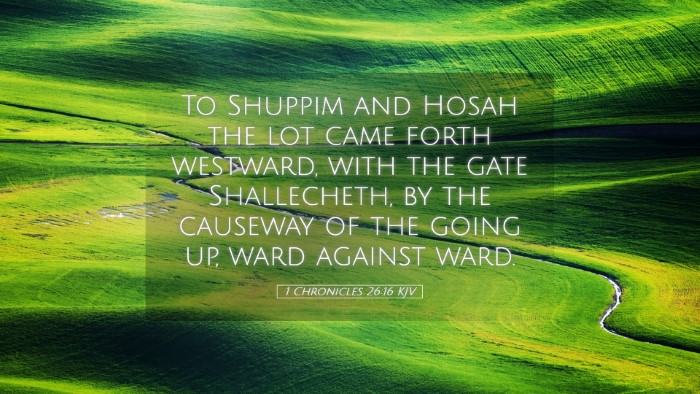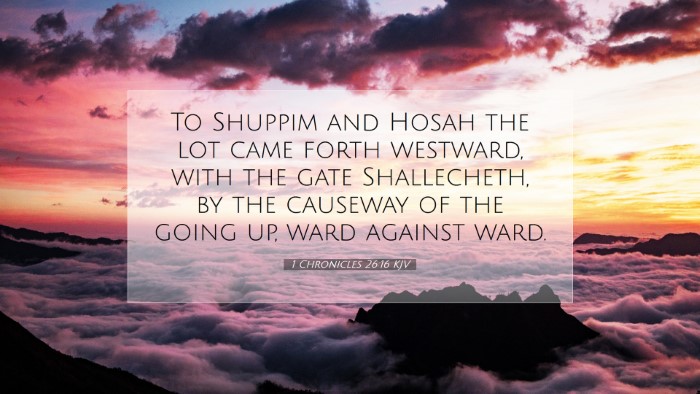Commentary on 1 Chronicles 26:16
Verse Reference: 1 Chronicles 26:16 - "In the chambers and rooms of the gatekeepers, along the south side, there were people assigned as gatekeepers in the east, west, and north, and they were assigned to the various gates of the temple." (paraphrased)
Introduction
This verse is positioned within the meticulous organization that characterizes 1 Chronicles, particularly regarding the administrative and ceremonial functions of those who served in the temple. It highlights the role of gatekeepers as essential to the temple’s worship functions. This commentary draws inspiration from the insights of noted commentators such as Matthew Henry, Albert Barnes, and Adam Clarke, who each provide valuable reflections on this verse.
Contextual Overview
The book of Chronicles emphasizes the importance of order and organization in worship, reflecting a broader theme present throughout the Old Testament regarding the sanctity and reverence of God's dwelling place. The mention of gatekeepers in this context affirms the necessity of protecting and facilitating worship through orderly access to the temple.
Matter of Assignments and Responsibilities
Matthew Henry's Insight: Henry notes the profound importance of obeying divine order in the temple's functions. The gatekeepers are seen not just as physical guards but as custodians of spiritual integrity. They play a vital role in filtering who enters and exits the sacred spaces, thus maintaining a sanctified atmosphere.
Albert Barnes' Interpretation: Barnes emphasizes the practical implications of having gatekeepers in specific locations. He stresses that these roles were not only about security but also about the symbolic function of controlling users' access to holiness; they helped maintain the reverence of worship and order within the temple community.
Adam Clarke’s Commentary: Clarke elaborates on the structures of the chambers and rooms for gatekeepers, suggesting that these were thoughtfully constructed to support their duties. His analysis underscores the physical and spiritual dimensions of their roles, highlighting the need for both spatial and heart-driven guarding of the church.
The Spiritual Significance of Gatekeeping
The concept of a gatekeeper extends beyond physical service to a spiritual metaphor representing those who guard the faith. This verse serves as a reminder that each member of the community plays a part in protecting the integrity of faith and worship.
- Vigilance: Gatekeepers must remain vigilant, reflective of the spiritual alertness required of all believers.
- Access to God: Gatekeeping signifies the importance of having guidelines and conduct that honor access to God.
- Community Role: The roles assigned to each gatekeeper demonstrate the necessity of communal responsibilities in worship.
The Structure of Worship as Divine Order
Each role within the temple, including the gatekeepers, was part of a larger divine order curated by God. The precise organization emphasizes God's desire for worship to occur in an orderly and respectful manner.
Matthew Henry observes: The orderly assignment facilitates respect for the sacred, reminding us that worship requires preparation and intentionality.
Application for the Church Today
For modern pastors and church leaders, understanding the implications of 1 Chronicles 26:16 is critical. It encourages the establishment of ministries and roles that maintain order in worship, ensuring a respectful environment for the congregants.
- Role Development: Churches should clearly define and appreciate the roles that individuals play within the worship setting.
- Spiritual Vigilance: Just as gatekeepers were watchful, modern believers are called to be vigilant against distractions that hinder worship.
- Communal Involvement: Encourage congregation members to find their place in serving, whether as leaders or contributors to worship logistics.
Conclusion
In conclusion, 1 Chronicles 26:16 serves as a profound reminder of the divine order in worship, the importance of roles within the community, and the spiritual implications of guarding sacred spaces. Understanding these facets can greatly enhance the dynamics of worship within our churches today.
By reflecting on the insights of Matthew Henry, Albert Barnes, and Adam Clarke, we gain a deeper appreciation for the roles we play as gatekeepers in our faith communities and organizations.


